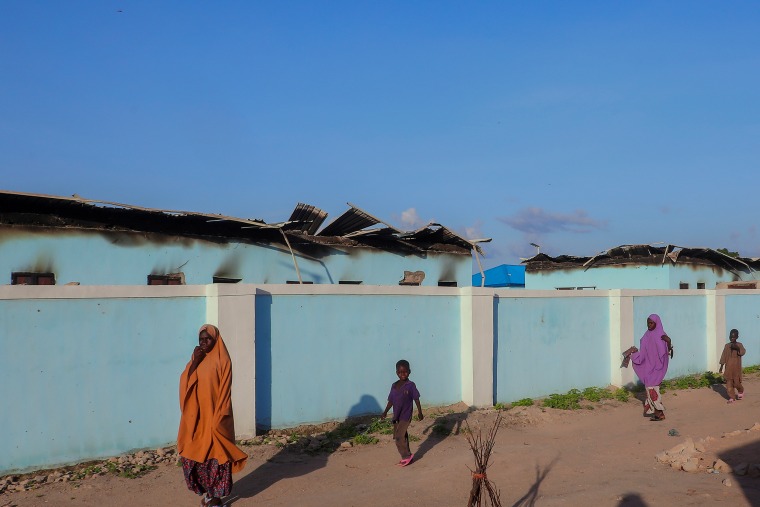WASHINGTON – A Fox News report prompted President Donald Trump to accuse Nigeria of killing Christians and then threaten military actionwhich sparked a fight at the White House over the weekend, according to several US officials.
It is still unclear what, if anything, the administration will do to counter Islamic militants in NigeriaBut precision drone strikes are among preliminary options being considered, two U.S. officials said.
A White House spokesman declined Monday to provide any details of the plans under consideration.
“At the direction of President Trump, the administration is planning options for possible actions to stop the killing of Christians in Nigeria,” spokeswoman Anna Kelly said in a statement. “Any statements will come directly from the president.”
Trump's first social media post about Nigeria came Friday night after he watched a Fox News report on violence in the West African country, two administration officials said. The president asked his staff for more information about the situation and soon after said in a Truth Social post that he was calling Nigeria a “country of particular concern” because of its failure, in his words, to stop the “massacre” of Christians.
Trump then went further in a Saturday post, directing the Defense Department to prepare for possible military action.
“If the Nigerian government continues to allow the killing of Christians, the United States will immediately cease all aid and assistance to Nigeria and may well enter this now disgraced country 'guns blazing' to completely destroy the Islamic terrorists who commit these horrific atrocities,” Trump wrote.
This is not the first time the president's quick social media posts have moved faster than policy discussions, with officials rushing to develop diplomatic and military options while allied governments are caught off guard.
Experts and scholars who follow developments in Nigeria say Trump's portrayal of the country's security situation as a “Christian genocide” is misleading and oversimplistic, as Nigerians of all faiths have suffered at the hands of Islamist extremists and other groups.
Trump's posts even contradicted one of his own senior State Department advisers, Masadou Boulous, who said last month that more Muslims have died than Christians.
“People of all religions and all tribes are dying and it is very sad, and we even know that Boko Haram and ISIS are killing more Muslims than they are killing more Christians,” Boulos said during a meeting with Nigerian President Bola Ahmed Tinubu in Rome, according to state media. Voice of Nigeria. “So people are suffering from all walks of life. It’s not aimed specifically at one group or another.”

Speaking to reporters on Monday, Trump hinted that he would be willing to send troops to Nigeria, but that seems a far less likely option because he is generally reluctant to deploy troops to conflicts abroad, according to two U.S. officials.
A senior Trump administration official said the White House is in regular contact with the Nigerian government.
“We hope that the Nigerian government will be a partner in the process of addressing this problem and will work with the United States to take swift and immediate action to combat the violence that is affecting Christians, as well as countless other innocent civilians across Nigeria,” the official said.
The Nigerian government was taken aback by Trump's remarks, but officials cited the two countries' friendly relations. and called for cooperation between the two governments to combat the threat posed by Islamist groups.
Daniel Bwala, an adviser to Nigeria's president, told the BBC that any military action against Islamist groups must be carried out jointly. Nigeria would welcome US help in fighting the militants, but added that it was a “sovereign” country.
Insurgent groups such as Boko Haram and the Islamic State affiliate in West Africa sometimes use anti-Christian language, but their attacks are indiscriminate, targeting civilians, officials and local leaders regardless of religion, according to Miriam Ada, an analyst with the Armed Conflict Location and Event Data Project (ACLED), a US-based nonprofit that tracks conflicts and crises.
“In Nigeria, violence is widespread and complex. It involves insurgents, bandits, ethnic clashes and land disputes, rather than a unified campaign to kill Christians,” Ada said. “Both Christians and Muslims are victims.”
The bipartisan US Commission on International Religious Freedom has pointed to violence against Christians and Muslims in Nigeria, saying there are systematic violations of religious freedom in the country. “The violence affects large numbers of Christians and Muslims in several states in Nigeria,” the commission said in a report last year.
He also described the Nigerian government's response to attacks on Nigerian citizens by “non-state actors” as slow or ineffective.
Experts say Islamist groups such as Boko Haram are not the only perpetrators of violence in Nigeria.
In addition to Boko Haram and the Islamic State branch in northern Nigeria, there is a separatist movement in the southeast, ethnic militant groups in the oil-producing Niger Delta, kidnapping gangs in the northwest and clashes between Muslim herders and Christian farmers in the Middle Belt fueled by climate change.
Experts say Trump's comments may have had more to do with domestic American politics than addressing the security threat in Nigeria.
Some Republican lawmakers who support elements of the Nigerian Christian diaspora in the United States have long focused on the plight of Christians in Nigeria. Experts say Trump may have been trying to convey a message to his Christian supporters in the United States.
“Republicans on the Hill in particular have been trying to frame Nigeria as a 'Christian genocide' for years, and they have strong allies in the Nigerian diaspora in the United States,” said Darren Kerr, dean of the School of Peace Studies at the University of California, San Diego.
Nigeria's population of 230 million is almost evenly divided between Muslims and Christians, and sectarian divisions have sparked political violence in the past. Trump's comments potentially threaten to “light the match” on an already fragile situation, Kerr said.
“Putting the weight of the United States solely on the Christian side and viewing the situation in Muslim-Christian terms is probably extremely unhelpful for both Christians and Muslims in Nigeria,” Kerr said.
But the United States has reason to question the Nigerian government's use of weapons and other aid Washington has provided over the years, Kerr said.
“If the president had been more restrained in his comments, saying, 'Nigeria, we're giving it all this money, what happened? That, I think, is a legitimate criticism from the United States when they say to the government, “Look, what are you guys doing? Where's the strategy? Where is the success, where is the progress we expect?







